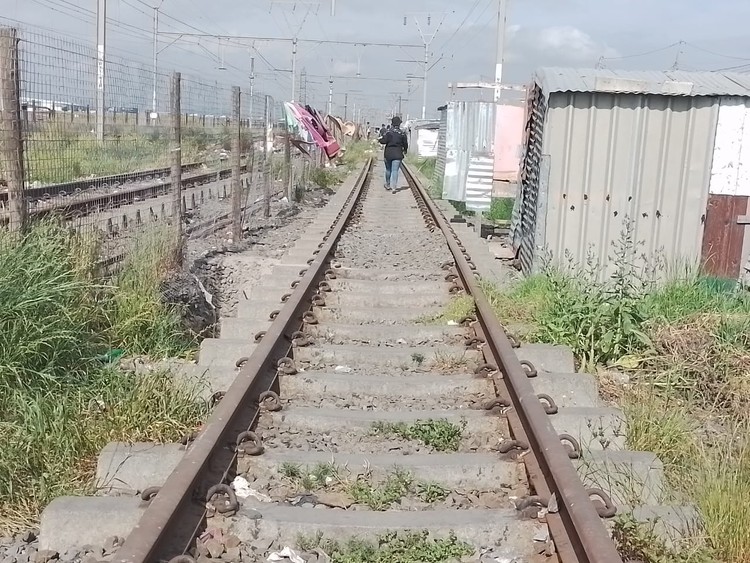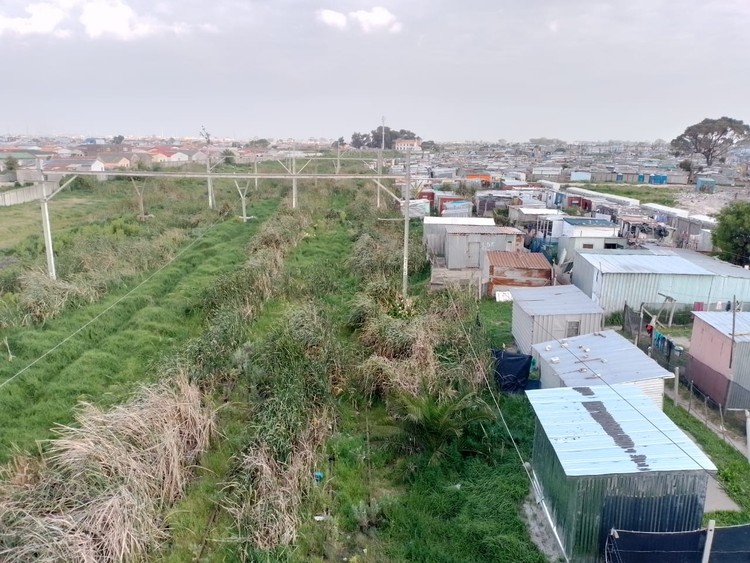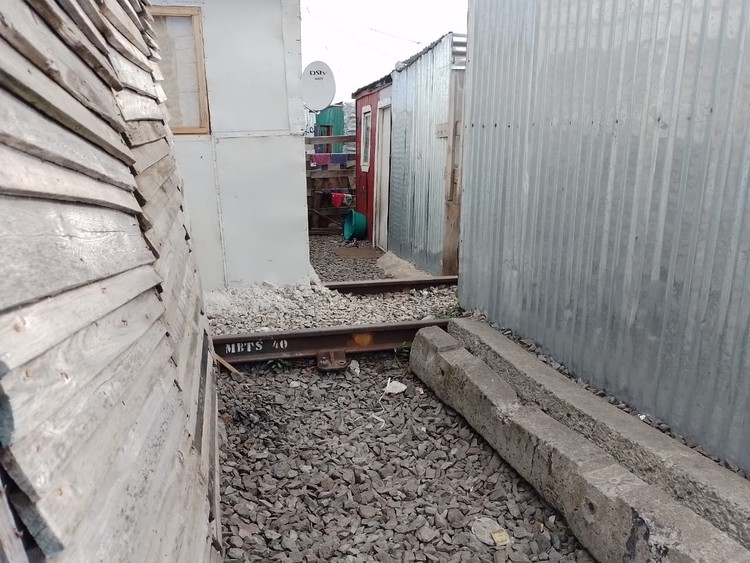Almost 4,000 households still to be moved off Cape Town railway land
While plans for temporary relocation of 891 households occupying the Central Line are making progress, thousands of households remain on the railway
Thousands of people have occupied Cape Town’s Central Line. Photos: Sandiso Phaliso
- More than 1,000 households have been temporarily moved off the railway line in Langa. The Central Line to Khayelitsha currently only runs as far as Nyanga.
- Land has been identified and cleared for the further temporary relocation of 891 households occupying the line in Philippi.
- But the permanent relocation of the Langa households, and almost 4,000 households still occupying PRASA land in Philippi and Khayelitsha, remains a challenge.
While immediate intervention to resume the rail service along Cape Town’s Central Line to Khayelitsha, even if on a limited scale, was on track for March next year, the long-term, permanent relocation of households still occupying the line remains a challenge. This was according to Housing Development Agency (HDA) provincial head Ndumiso Mkhwanazi, while addressing SCOPA.
It emerged during a meeting of Parliament’s Standing Committee on Public Accounts (SCOPA) on Wednesday that nearly 4,000 households still occupy PRASA-owned land beyond Nyanga in Philippi.
Shacks were built on the rail reserve and rail line in Langa, Nyanga, and Philippi during the Covid lockdown in 2020. Trains had already stopped running on the Central Line in October 2019 due to theft and vandalism. The situation was exacerbated by PRASA’s cancellation of security contracts.
Currently, the line has been reinstated as far as Nyanga, after more than 1,250 households occupying the line at Langa were temporarily relocated. However, in a joint presentation to SCOPA by the Housing Development Agency (HDA) and PRASA, HDA provincial head Ndumiso Mkhwanazi said the main challenge to reopening the Central Line – dubbed Operation Bhekela - was finding land to permanently relocate the households occupying the line.
Mkhwanazi said R117-million was needed for the permanent relocation of the Langa households, and there were also 3,941 households occupying PRASA land in Philippi and Khayelitsha. Of these, 891 households were being temporarily relocated to land next to the Stock Road train station in Philippi.
He said land for the Langa households had been identified and a rezoning application had been lodged with the City of Cape Town in August. The rezoning process would take until March next year. Only then would they be able to move to the next phase. Funding for this would come from the Informal Settlements Upgrading Grant in the 2024/25 financial year. The estimated completion date for the Langa permanent relocation was February 2025.
He said land still needed to be acquired for the households in Philippi and Khayelitsha. This included the households being temporarily relocated to the Stock Road station land. This would be Operation Bhekela phase 2.
He said about R50-million was needed to acquire land. Meetings with National Treasury had determined the earliest the funding could be secured was “possibly through the mid-term budget adjustment”.
He said the length of time it would take to finalise permanent accommodation was the “main risk” to Operation Bhekela, as communities had stressed they want confirmation of where they are ultimately to be moved.
He said the steering committee had resolved that PRASA would capitalise their costs related to land acquisition. This included R12.7-million provided by the HDA, which would have to be reimbursed, and the estimated R50-million for the phase 2 land acquisition. He said it was possible PRASA and HDA would enter into a funding agreement, and the land would ultimately be transferred to the City to enable the provision of basic services.
Work being done on temporary relocation site
Mkhwanazi said the assessment of the suitability of Stock Road station land for temporary housing had been completed by a newly appointed contractor on 13 September.
He said the land was suitable, but was being levelled and sloped, as there were low-lying areas where water pooled during the winter rains, most recently highlighted by the storms in mid-September.
Vegetation has grown over the line in parts.
Also, a fence needed to be built along the adjacent railway line to provide protection from the trains which were going to run. Access roads for vehicles needed to be built, and a buffer for the electrical power lines that run across a portion of the land needed to be put in place.
He said a meeting with the communities living on the Central Line had taken place on 11 September to “ensure their continued buy-in to the relocation programme”.
Future temporary relocation of the remaining households living further along the rail line was not discussed.
Community engagement
PRASA CEO Hishaam Emeran told SCOPA there had been “detailed engagements” with residents in ward 88, where the Stock Road station was situated, and the contractor had been introduced to the community with a site visit on 20 September.
Emeran said there had also been consultation with ward 34, where households occupied the rail line. He said job opportunities related to the relocation had been discussed, as well as the commencement of the relocation and resumption of work on the Philippi station. He said work at the Philippi station had been halted by the communities, but he was “happy to report” the contractor was back on site and agreement had been reached that work could proceed.
There had also been extensive and ongoing engagement with the Philippi business forum.
He said media reports that the open land at Stock Road station identified for temporary relocation was used for traditional Xhosa initiation rituals “took the team completely by surprise”. He said the use of the land for initiation purposes had since been confirmed, but it took place to the east of the open plot, on a section owned by Eskom. He said initiation practices would not be impacted by the temporary housing, and the land on which it took place would be fenced off to provide privacy to initiates.
He said 1.2-metre by 2-metre concrete slabs on which the temporary housing would be built were already being pre-cast off site. These would take about three weeks to complete, and the clearing and fencing of the land would take about ten days.
He said 100 jobs would be provided by the temporary relocation project. Of these 60 would be assigned to people from ward 88, and 40 to the households being relocated. He said it had been agreed the City of Cape Town would provide services to the site.
SCOPA chair Mkhuleko Hlengwa said the committee would meet again in November to determine progress.
Dispute over land acquisition
It emerged in the previous SCOPA meeting on the reopening of the Central Line, convened on 29 August, that the Department of Human Settlements had lodged a dispute with the City of Cape Town. This was related to the department having in March provided the City R50-million for the acquisition of land on which the railway occupiers could be permanently settled. But the City had returned the R50-million to the National Treasury, claiming they could not spend it within the two months left in the financial year.
But it is unclear whether a formal intergovernmental dispute had been declared. At the 29 August meeting, SCOPA chair Mkhuleko Hlengwa, said there appeared to be “a dispute of the dispute”, and clarification could not be obtained without input from the Department of Cooperative Governance and Traditional Affairs.
In response to questions from GroundUp, COGTA spokesperson Tsekiso Machike said there was no formal intergovernmental dispute as per the Intergovernmental Relations Framework Act (IGRFA), but Human Settlements Minister Mmamoloko Kubayi had requested COGTA Minister Thembi Nkadimeng provide an intermediary.
Machike said at a meeting on 18 September, the parties agreed the project steering committee meetings would be reconvened as a matter of urgency. He said the respective accounting officers should urgently resolve the financial and funding aspects of the implementation of the project, which would be done through project steering committee meetings, to which the COGTA director-general could be invited.
In his presentation on Wednesday, Mkwhanazi mentioned the intergovernmental meeting mediated by COGTA on 18 September, and said it had been resolved that the human settlements department would approach treasury for the R50-million “that was lost”. He said a request had been submitted, but not supported by treasury, which proposed the funding could be obtained at the mid-term budget adjustment.
Shacks have been built on both sides of the line.
Next: People living with disabilities march to Musina municipality for services and jobs
Previous: Walter Sisulu students spend the night in jail after NSFAS protest
© 2023 GroundUp. This article is licensed under a Creative Commons Attribution-NoDerivatives 4.0 International License.
You may republish this article, so long as you credit the authors and GroundUp, and do not change the text. Please include a link back to the original article.
We put an invisible pixel in the article so that we can count traffic to republishers. All analytics tools are solely on our servers. We do not give our logs to any third party. Logs are deleted after two weeks. We do not use any IP address identifying information except to count regional traffic. We are solely interested in counting hits, not tracking users. If you republish, please do not delete the invisible pixel.





